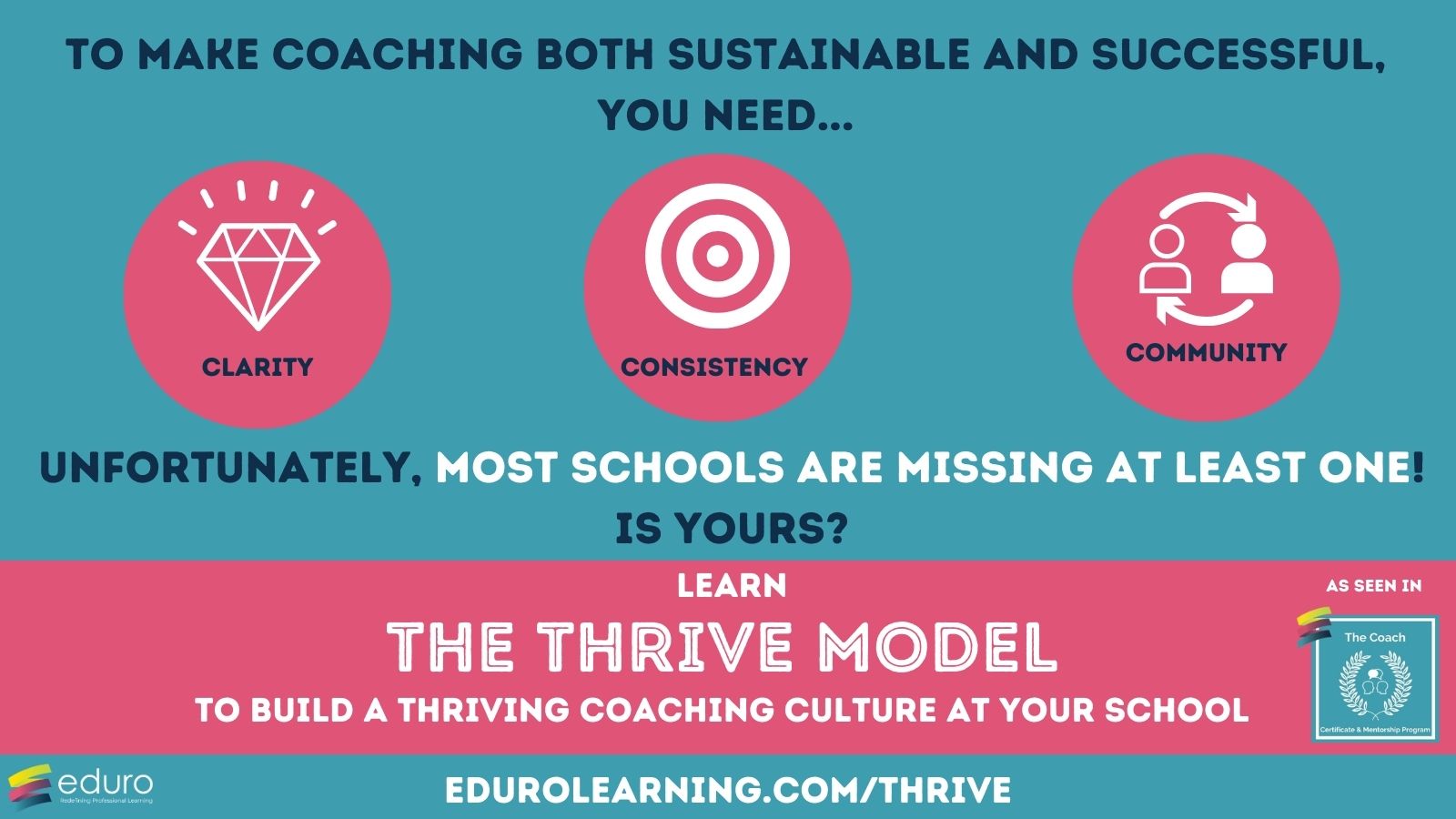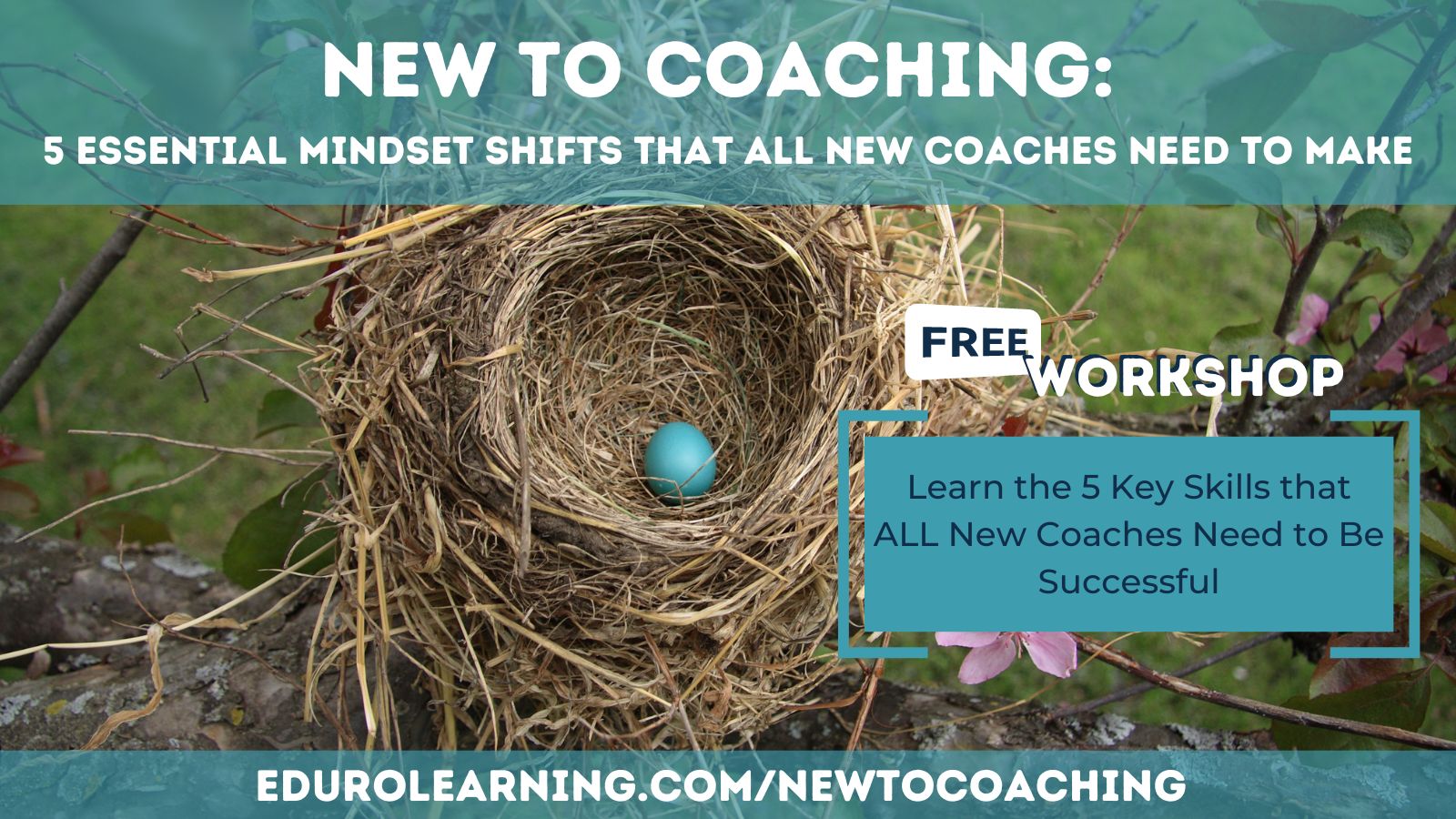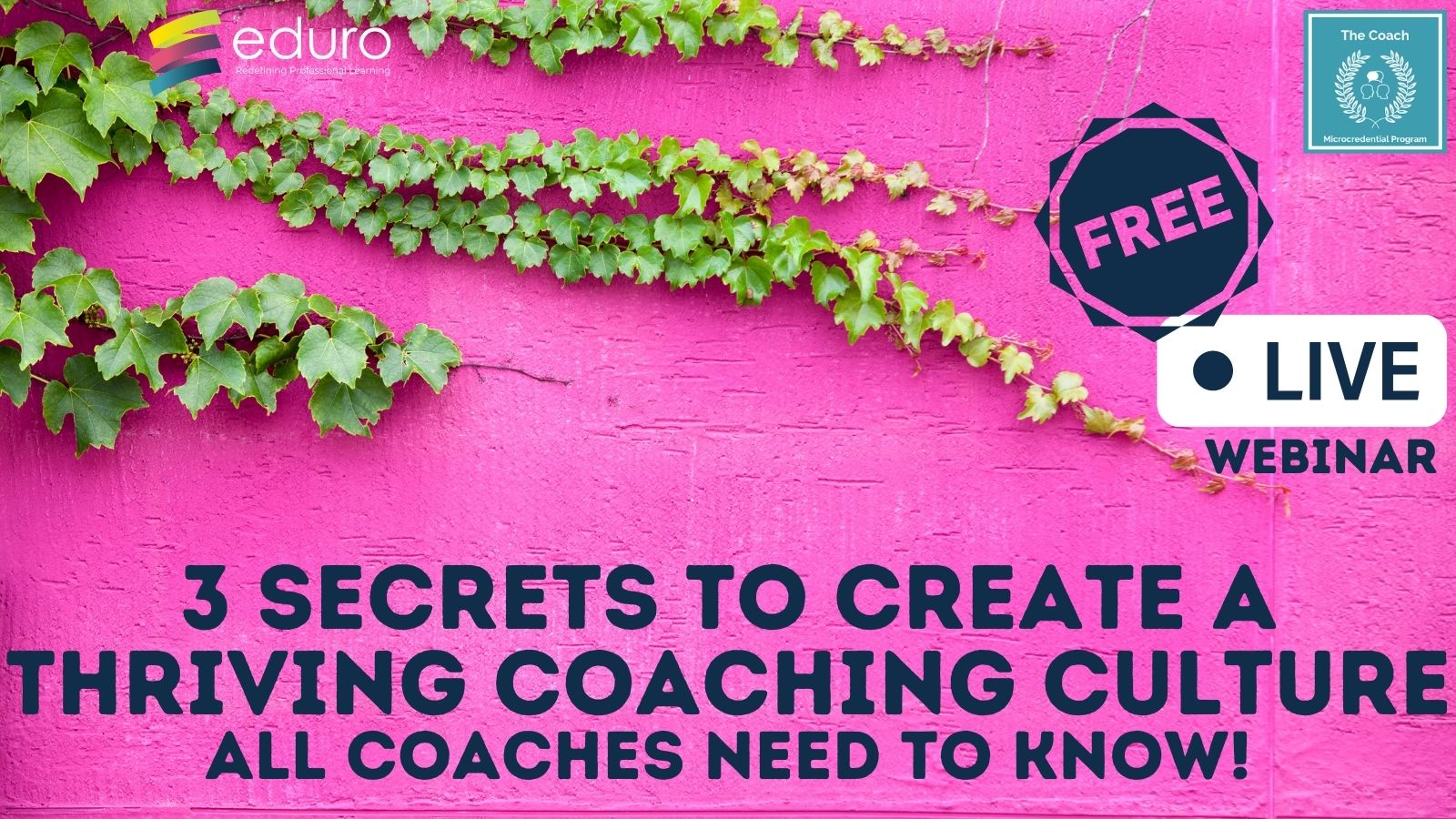In this #coachbetter episode we’re chatting about the Thrive Model for Instructional Coaching Success which Kim developed after a decade of working with coaches and school leaders around the world. The Thrive Model brings together all of her experience as a coach, as well as the experiences of her clients, and the expert guests she’s interviewed on this podcast. We use this model to structure all of our courses for coaches, and in particular The Coach Certificate and Mentorship Program. You’ll get an overview of the model in this episode, and how the three elements of Clarity, Consistency, and Community can be used to develop coaching programs, evaluate and refine existing programs, and support you in developing your own individual practice as a coach. With the Thrive Model we are intentionally designing for a culture of belonging through coaching with both a micro and a macro view.
Connect with our Featured Guests
Subscribe to #coachbetter via your favorite Podcast Player!
Bonus! Watch the Spotlight Version on YouTube!
SHOW NOTES
1: What is the Thrive Model?
Clarity
Finding Clarity is the essential first step in building a coaching culture and developing your coaching program and practice.
With clarity comes purpose. When we are clear on what the expectations are, we can implement the work, and then evaluate the results. Without clarity, we have confusion, miscommunication, and misalignment of roles and expectations.
Consistency
Consistency clarifies expectations. When you are able to implement coaching with consistency, you can demonstrate to teachers why they might want to opt-in to coaching with you.
When coaching is consistent, teachers know what to expect, so they know it’s a valuable use of their time.
Community
Community grows culture. When coaches can begin to develop connections between teachers, to build capacity within the staff, they will build the foundations for a coaching culture.
Kristen: For psychological safety & understanding, this is how we’re gonna work together and consistently, this is how we’re going to work together. So you know what to expect. That certainty is essential, we need that for our students, and we definitely need that as adults. And then that community piece, you just, you realize you’re not alone, right Like it’s, it’s one thing to have maybe a, a team that you work with or the teachers down the hall, but you know, it’s, unless you’re in a co-teaching model, really it’s, it’s you and your class, but being able to have someone who is seeing the work that you’re doing, understanding at a deeper level, it is just, it is so powerful. And so the three of those ideas together is just, it’s revolutionary and it can just totally change the way that not just you are as a teacher, but is the way you are as a human being.
Diana: I had to spend a lot of time and energy getting it clear for myself and then also for the people, the teachers that I was working with and the administrator, the leadership as well. And so for me it’s those, those three really build on each other. If you’re not really clear and have your purpose and you understand that yourself, you, it’s hard for you to communicate that to others. And then you have to spend time communicating that you can’t, it’s hard to get to consistency if you don’t have that, that base purpose and, and clarity of what the role is and how everyone interacts with that role.
Once you have that, and then you can build that consistency in practice because when people understand what the, what’s happening, they, and there’s this, this, the strategy that you’re using become familiar, then the community begins to build more. And so I really like that framework.
We’ve worked a lot with coaches and a lot of them start in that clarity part because they’re like, I really need to get clear about my job myself and then, my school community as well. So that clarity and that purpose: if I don’t have it as an instructional coach, it’s really hard. If there’s not clarity with the teachers and with the leadership in the school community, then it’s really gonna be challenging. When those are in place things run much more smoothly. It’s just, there’s so much more, it’s much more effective and meaningful for those who are, are either the coach themselves or are, working with a coach.
2: Why is looking at coaching from this lens so important?
Diana: For me big shift in my coaching practice was, I started out really focused on my work with individual students with individual teachers in their classrooms. And that, and then as I, my role grew, I got more of that macro view that you talked about because of my conversations with administration working with different teachers in different divisions or different grade level teams. And so then I started to see, okay, this is working at this level in the classroom or working on a team. But is it expanding into the, you know, how is it expanding into the bigger picture of the school or the division or the district, depending on which school community you’re working with? So I think, as a coach, we’re constantly, you know, checking ourselves in those individual team relationships, but then also checking within the bigger picture of the school. So I think that’s what I love about the role of coaching too, is that you really get to see all these individual amazing things happening in the classroom and supporting that, but then also seeing that as a big picture as well. and then how is this working within the school community
Kristen: That is like a big mental shift when you move into a coaching role because as a classroom teacher, you are so focused on those human beings in your classroom and you are focused on your people. And then the grade level maybe, and then maybe the division is like, you know, maybe, so as a coach to be taken from, you know, those 20, however many people in your room to, like you say, pre-K all the way up to 12, that’s a big mental shift to think about having to take that lens. And I think that’s something when coaches take the position of being a coach, they are so passionate about coaching, they want coaching to be successful. So the message I’m trying to get at in this part is like, don’t forget how important it is to see that big picture. You’re gonna do a great job having individual coaching conversations. That is obviously the primary focus, but don’t forget about that other piece because that’s how you’re gonna build that coaching culture.
EXPLORE THE THRIVE MODEL
Are you working on building a coaching culture in your school setting?
To make coaching both sustainable and successful, you need clarity, consistency, and community.
Unfortunately, most schools are missing at least one! Is yours?
Use the Thrive Model to find out!
Developed after working with hundreds of coaches and leaders in international schools around the world, the Thrive Model incorporates both the macro view of a coaching program, and the micro view of a coaches practice, to bring together the three essential elements to make coaching both sustainable and successful.
Explore all of our resources about the Thrive Model at edurolearning.com/thrive

SHOW NOTES continued…
3: How does the Thrive Model support our coaches in The Coach proactively develop not only their coaching skills but their coaching program?
It’s not just for the teacher who is new to coaching to understand what coaching is, but it’s also for the experienced coach who’s being a little bit more clear and intentional in the way they’re communicating about their role for their coaching partners to help them opt into coaching. And then the even more experienced coach who maybe is being more intentional and clear in the way that they’re talking about their role with their school leader.
4: How do you see the Thrive Model being beneficial for the coaches that you work with? How have your coaches used it to develop their programs? (How could you see this being beneficial in your own experience as a coach)
We talk a lot about these three areas of clarity, consistency and community. and I think that it’s really helpful as a framework, but there’s also some flexibility in that for a, a school community, a district, a school organization to define what those are for themselves, and then that’s how they can measure it. And so I think it’s a great framework. It really pulls out these three areas that need to be, to be considered, for a coaching program or maybe even the school in general. but then there’s guidance within it, I think that schools could use to then decide what, what this means for us. Clarity is about purpose. What’s the purpose for our school? consistency is about expectations. So what’s the expectations for our, for our school? community is about that coaching culture where you can measure how many people are getting involved, what connections are being made, how people are engaging in this. And so I think, they seem like these really abstract turns in a way, but they are things that can be, topics to help develop things that are more concrete, that can be measured, that can be observed, and adapted along the way. I think it’s this, it’s a constant work in progress. Yes. But it’s a way to have a touchstone to do that and also to adapt it, to, to your specific school situation.
In your experience in schools, what makes coaching work?
Kristen: When I think about the coaching community side, establishing a coaching community, ongoing sustained support for the coaches who are doing the work. I just think that is the most essential thing. You, you can’t do this work alone. You have to be able to have a, a meta coach, someone to help you think about your coaching with someone to talk through, different ideas, someone to help you. Like what’s a great question to ask in this, in this situation And, and it’s not about violating, you know, coaching confidentiality or anything like that, but it’s, it’s really helping. I need to get to this place and I, I need that support. And you, you mentioned earlier, Kim, about like this, you know, coaches constantly refining their practice. Being able to do that with a group of like-minded people is incredible. I was so fortunate that my first experience as a coach was on a district-level team of over 70 coaches, and it was life-changing. So for me, that’s just how it works, right? And so, you know, obviously, it doesn’t in many other places, but that for me is the most, most, most important thing to have coaching be successful.
Ready to apply the Thrive Model in your coaching practice?
If you’re ready to dig deeper into how Clarity, Consistency, and Community can impact instructional coaching in your coaching role and your school or organization – or if you’re new to instructional coaching and you’re curious about getting started, join us for one of our courses for coaches!
One of the things we’re most proud of here at Eduro is that there’s no one-size-fits-all learning – you always have choice and voice in how you learn with us. Today’s video highlights one of the key themes that you’ll find in three of our programs, and if you’re curious to take your learning deeper, we have three great options for you.
New Coaches:
If you’re just getting started as a coach, and you want to learn how to make these mindset and skillset shifts, watch our New to Coaching Workshop, which will also tell you all about our brand new course, Getting Started as a Coach.

Experienced Coaches:
If you’re already a coach & you want to think about being more intentional & strategic in your practice, watch our workshop on the Thrive Model for Coaching Success which will help you evaluate your program to see where you may have room to grow – and help you decide if our year-long mentorship and certification program, The Coach, is right for you, right now

Just like all our learning experiences, the content in both of these courses is self-paced so you get access to everything immediately – but you get so much more: when you join the course, you get access to our #coachbetter global community with optional group coaching calls at various time zones to meet & connect with other coaches PLUS private office hours with me to get all your questions answered & work through anything coaching related in your unique school context.
Wherever you are in your coaching journey, we can support you!
For All Coaches
Connect with us!
- Subscribe to the podcast iTunes | Spotify | Stitcher
- Follow us on social media: Twitter | Instagram | LinkedIn
- Join our #coachbetter Facebook group
- Explore our courses for coaches
![Understanding the Thrive Model with The Coach Mentors [Ep 211]](https://res.cloudinary.com/edurolearning/image/upload/v1692248873/coachbetter%20Podcast/Thrive_Model_s07c7s.jpg)




Recent Comments